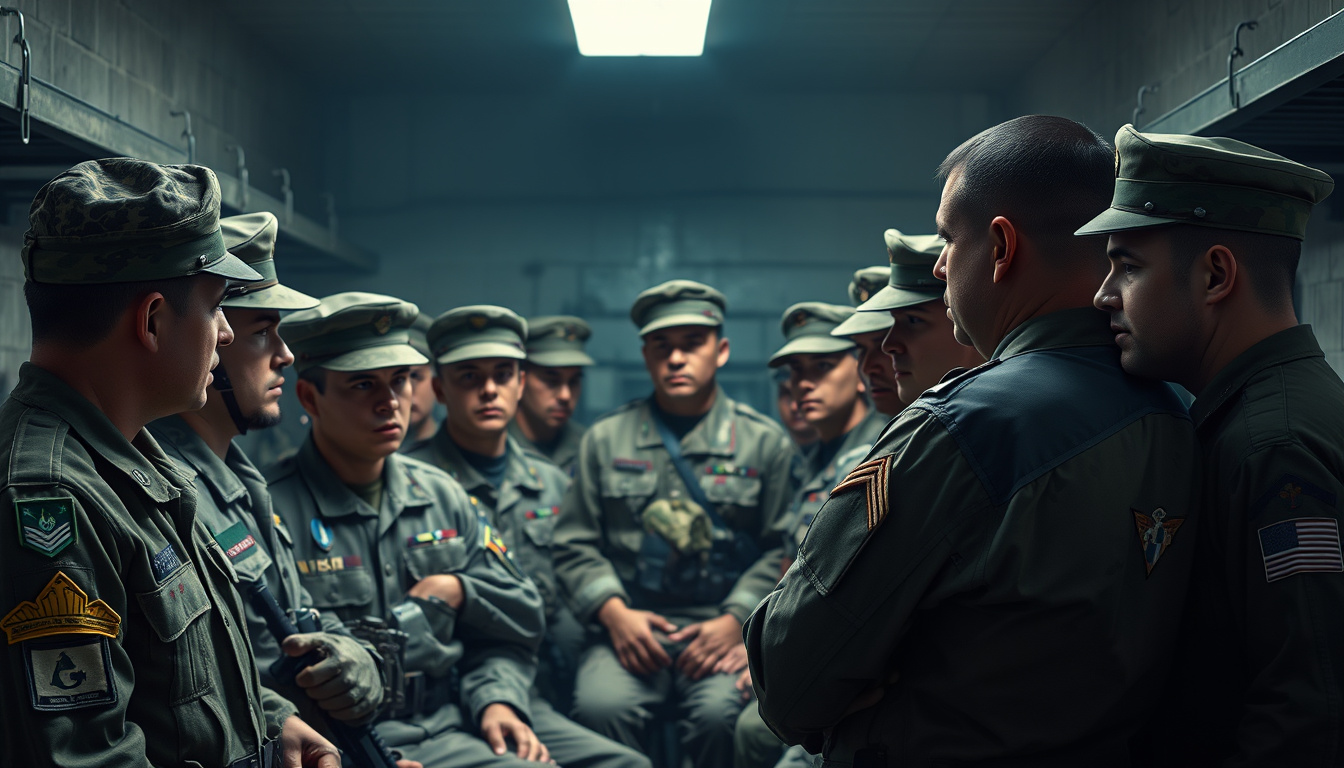In the military, the integrity of a servicemember’s reputation is paramount, and the channels for addressing grievances must be clear and accessible.
The Alse Sharp complaint mechanism within the Army serves as an essential platform for soldiers to voice concerns regarding harassment, discrimination, and misconduct.
Understanding how this system operates, the types of complaints commonly filed, and the potential ramifications on military policy is crucial for both servicemembers and their families who may be navigating this complex landscape.
This article will provide a comprehensive overview of the Alse Sharp complaint process, its impact on military culture, and insights into both successful and challenging cases, all aimed at increasing awareness and guiding service members through their rights and responsibilities.

Key Takeaways
- Alse Sharp Complaint Army provides a structured mechanism for military personnel to voice grievances.
- Soldiers commonly file complaints regarding discrimination, harassment, and unsafe working conditions.
- Successful complaints can lead to significant changes in military policy and improve the overall environment for service members.
- Complainants often face challenges such as retaliation or lack of proper support in the complaint process.
- Understanding the outcomes of previous cases can inform and empower future complainants within the military.
Introduction to Alse Sharp Complaint Army
The Alse Sharp Complaint Army program is an integral part of the Army’s efforts to ensure accountability and fairness within its ranks.
If you’re a military servicemember or a family member facing challenges related to the Alse Sharp Complaint Army, understanding this system can be crucial.
This procedure allows soldiers to raise concerns regarding discrimination based on race, color, religion, sex, national origin, and other factors.
It serves as a vital platform for ensuring that every servicemember’s voice is heard, maintaining the integrity and cohesion of military units.
Whether you are facing a court martial, navigating allegations under the Uniform Code of Military Justice (UCMJ), or dealing with administrative separation, having a clear grasp of the Alse Sharp Complaint Army can provide significant insight into your rights and options.
In this article, we will dive deeper into the Alse Sharp Complaint Army, how it works, and its implications for servicemembers and their families.
Overview of the Complaint Mechanism
When it comes to addressing grievances within the military, servicemembers may find themselves navigating the complaint mechanisms established by the Armed Forces.
One key avenue is the ALSE Sharp complaint Army, which is designed to address incidents of sexual harassment and sexual assault.
This framework allows for individuals to report concerns while ensuring their rights and dignity are preserved.
Understanding the ALSE Sharp complaint process is essential for military servicemembers and their families, particularly when facing potential violations of the Uniform Code of Military Justice (UCMJ) or administrative discipline.
This article will delve into the intricacies of the complaint mechanism, outlining what servicemembers should know about filing a complaint, the investigation process, and their available options.
Being informed and aware of these procedures is critical not only for those directly involved but also for ensuring a safer and more just environment within the military community.
‘The soldier is the army. No army is better than its soldiers. The soldier is also a citizen. There is a great need for the citizen and soldier to be one and the same, for the soldier must reflect the values of the nation to be truly effective in their duties.’ – General Douglas MacArthur

Common Complaints Filed by Soldiers
In the Army, service members have the right to report various types of misconduct, and one of the most critical mechanisms for addressing issues related to sexual harassment and assault is the ALSE Sharp complaint system.
ALSE, which stands for the Army’s Sexual Harassment/Assault Response and Prevention program, lays the groundwork for a zero-tolerance policy towards misconduct.
Soldiers may file an ALSE Sharp complaint when they experience or witness incidents of sexual harassment or assault, creating a formal record that can lead to investigations and possible disciplinary actions against alleged offenders.
Common complaints that soldiers report under this system often involve inappropriate comments, unwanted physical advances, and other forms of harassment that create a hostile work environment.
The importance of understanding the ALSE Sharp complaint process cannot be overstated, as it not only serves as a means of support for victims but also aims to foster a culture of accountability within the military.
If you or someone you know is considering filing an ALSE Sharp complaint, it’s crucial to understand your rights and the procedures involved, as this can have significant implications for both the individual and the broader military community.
Impact of Complaints on Military Policy
The impact of alse sharp complaints in the Army cannot be understated, as these complaints serve as a vital mechanism for addressing and rectifying issues surrounding misconduct and discrimination within the military.
The alse sharp complaint process is designed to empower servicemembers by providing them with a formal avenue to report instances of harassment and inappropriate behavior, thereby fostering a culture of accountability.
Moreover, these complaints can catalyze critical changes in military policy, ensuring that concerns raised by servicemembers are taken seriously.
When an alse sharp complaint is filed, it prompts investigations that can illuminate systemic issues within a unit or the broader military framework, spurring command leadership to implement necessary reforms.
Ultimately, addressing alse sharp complaints effectively not only aids individual servicemembers but also enhances the overall integrity and effectiveness of military operations.
This is particularly important for servicemembers and their families facing court martial or administrative actions, as a military environment characterized by respect and adherence to regulations can significantly influence the outcomes of such disciplinary proceedings.

Case Studies: Successful Complaints
### Case Studies: Successful Complaints – The Alse Sharp Complaint in the Army
When it comes to addressing serious issues within the military, particularly those related to harassment, misconduct, or discrimination, the Alse Sharp complaint process in the Army can play a pivotal role.
Understanding how to navigate this process effectively is crucial for servicemembers and their families who may be facing court martial or UCMJ actions.
Here, we will explore several case studies that highlight successful complaints filed under the Alse Sharp complaint Army process, demonstrating the pathways to achieving accountability and justice.
#### Case Study 1: Overcoming Sexual Harassment
In one notable case, a female soldier reported sexual harassment by her direct supervisor.
Utilizing the Alse Sharp complaint mechanism, she meticulously documented the incidents and sought support from fellow soldiers, providing firsthand accounts of the supervisor’s inappropriate behavior.
The complaint was filed with the appropriate authorities, resulting in a comprehensive investigation.
The outcome not only saw significant disciplinary measures taken against the supervisor but also led to a broader review of workplace safety within that unit, ensuring that a culture of harassment was not tolerated.
This case exemplifies the efficacy of the Alse Sharp complaint process, showcasing how formal complaints can lead to tangible change within military environments.
#### Case Study 2: Retaliation Stopped
Another case involved a soldier who faced retaliation after voicing concerns regarding racial discrimination within his unit.
Following the Alse Sharp complaint process, he outlined specific incidents that highlighted systemic issues affecting personnel.
The investigation revealed a troubling pattern of retaliatory behavior, leading to disciplinary actions against several key individuals involved.
This soldier’s experience sheds light on the importance of protecting whistleblowers and encouraging servicemembers to utilize the Alse Sharp complaint system to address grievances without fear of retaliation.
#### Case Study 3: Administrative Separation Case
In a complex situation involving administrative separation, a soldier was wrongfully accused of misconduct that stemmed from a personal vendetta by a superior officer.
The soldier filed an Alse Sharp complaint, which was vital in gathering evidence to contradict the allegations.
By leveraging documentation, testimonies, and the formal complaint’s findings, the soldier was ultimately exonerated.
In this case, the Alse Sharp complaint process proved instrumental in securing a fair review of actions taken by the command, allowing the servicemember to continue their military career without the stain of unfounded accusations.
#### Key Takeaways from Successful Alse Sharp Complaints
These case studies illuminate the potential outcomes for servicemembers who engage with the Alse Sharp complaint process.
Here are key takeaways:
1.
Document Everything: Successful complaints often stem from meticulous documentation of incidents.
Keeping detailed records can substantiate claims and create a compelling case.
2.
Seek Support: Building a network of allies can empower servicemembers and provide the necessary backing when filing complaints.
Peer testimonies can strengthen a case significantly.
3.
Professional Guidance: Engaging with legal counsel knowledgeable about military law can help ensure that servicemembers navigate the process effectively, especially when administrative separation or court martial is a risk.
4.
Persistence is Key: The process can be lengthy and tiring.
Successful complainants emphasize the importance of persistence, ensuring their voices are heard despite potential setbacks.
5.
Know Your Rights: Understanding the rights afforded to servicemembers can help navigate the complexities of the military justice system.
Familiarity with the UCMJ and the specific provisions of the Alse Sharp complaint process will be invaluable.
In conclusion, the Alse Sharp complaint Army process is a vital tool for attaining justice and accountability within military ranks.
Armed with the right knowledge and resources, servicemembers facing court martial, UCMJ issues, or administrative discipline can leverage this complaint mechanism to protect their rights and uphold the integrity of military service.
Challenges Faced by Complainants
Facing a complaint in the military, especially an Alse Sharp complaint in the Army, can present numerous challenges for both the complainants and the accused.
For complainants, the emotional and psychological toll can be significant.
They may feel a sense of vulnerability, fear of retaliation, or skepticism about whether their complaints will be taken seriously.
The military environment often imposes strict hierarchies and code of conduct norms, where speaking out can be perceived as going against the chain of command.
This culture can make it difficult for individuals to come forward with their experiences, particularly if they fear social or professional repercussions.
Additionally, the administrative processes surrounding an Alse Sharp complaint can be daunting and complex.
Complainants may find themselves navigating intricate legal frameworks that govern not just their allegations but also how evidence is gathered, witness testimonies are taken, and how the investigation proceeds.
Moreover, the potential for significant consequences can add stress; successful complaints may lead to disciplinary action against the accused, while unsuccessful ones can result in feelings of guilt or isolation for the complainant.
All of these factors underscore the importance of robust support systems, such as legal counsel and counseling services, for those wishing to bring an Alse Sharp complaint in the Army forward.

Conclusion and Future Implications
In conclusion, the ALSA Sharp complaint process in the Army serves as a vital mechanism for addressing issues related to sexual harassment and assault within military ranks.
It emphasizes the Army’s commitment to fostering a safe and respectful environment for all servicemembers.
As we look towards the future, it is essential for the military to continually assess and improve the effectiveness of this reporting process.
Enhancements could include increased awareness campaigns, training for leaders on how to handle complaints sensitively, and ensuring that victims feel supported throughout their reporting journey.
By strengthening the ALSA Sharp complaint system, the Army not only upholds its values but also protects the integrity of its forces, ensuring that servicemembers and their families can focus on their duties without the fear of harassment or retaliation.
Frequently Asked Questions
What is the Alse Sharp Complaint Army?
The Alse Sharp Complaint Army is an initiative that empowers soldiers to voice their grievances and report issues within the military, fostering a culture of accountability and transparency.
How can soldiers file a complaint through the Alse Sharp Complaint Army?
Soldiers can file a complaint by utilizing the established complaint mechanism, which typically involves submitting a formal report or using designated channels set up by military leadership.
What types of complaints are most commonly filed by soldiers?
Common complaints filed by soldiers include issues related to workplace harassment, discrimination, unfair treatment, duty assignments, and concerns about safety and welfare.
What impact do these complaints have on military policy?
Complaints lodged through the Alse Sharp Complaint Army can influence military policy by prompting reviews of existing protocols, leading to reforms that enhance the overall environment for service members.
What challenges do soldiers face when filing complaints?
Soldiers often encounter challenges such as fear of retaliation, bureaucratic hurdles, a lack of awareness about the complaint process, and stigma associated with reporting grievances.
If you or a loved one is under investigation or facing charges under the UCMJ, don’t wait to protect your future. Contact Gonzalez & Waddington, Attorneys at Law. Our battle-tested military defense lawyers have successfully defended service members worldwide against the most serious military offenses. Call us today for a confidential consultation and put our elite military defense attorneys in your corner.



